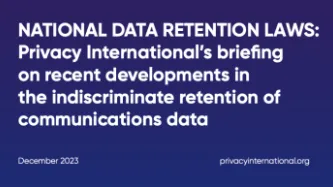Advanced Search
Content Type: Report
Over the past years, data retention regulation imposing generalised and indiscriminate data retention obligations to telecommunication companies and Internet service provides has been introduced in various jurisdictions across the world. As the data retention practices across the world have evolved this new report is an attempt to shed some light on the current state of affairs in data retention regulation across ten key jurisdictions. Privacy International has consulted with human…
Content Type: Long Read
Additionally, in January 2020 Privacy International and UK-based NGO Liberty filed a new claim against MI5 and the Secretary of State for the Home Department in the Investigatory Powers Tribunal (the “Ungoverned Spaces Case”, this time, the case sought to hold MI5 and the SSHD accountable for systemic, long-term failures in the way they handle and retain millions of people’s personal data. As part of this claim, PI requested that the IPT re-opens parts of the original BPD/BCD. This aspect of…
Content Type: News & Analysis
What happened
On 22 July 2021, the Investigatory Powers Tribunal (IPT) issued a declaration on our challenge to the UK bulk communications regime finding that section 94 of the Telecommunications Act 1984 (since repealed by the Investigatory Powers Act 2016) was incompatible with EU law human rights standards. The result of the judgment is that a decade’s worth of secret data capture has been held to be unlawful. The unlawfulness would have remained a secret but for PI’s work.
You…
Content Type: Long Read
Content Type: Long Read
Q&A: EU's top court rules that UK, French and Belgian mass surveillance regimes must respect privacy
Content Type: Press release
By treating everyone as a suspect, the bulk data collection or retention regimes engage European fundamental rights to privacy, data protection, freedom of expression, as guaranteed respectively by Articles 7, 8, and 11 of the EU Charter of Fundamental Rights.
Caroline Wilson Palow, Legal Director of Privacy International, said:
"Today’s judgment reinforces the rule of law in the EU. In these turbulent times, it serves as a reminder that no government should be above the law. Democratic…
Content Type: News & Analysis
Today Advocate General (AG) Campos Sánchez-Bordona of the Court of Justice of the European Union (CJEU), issued his opinions (C-623/17, C-511/18 and C-512/18 and C-520/18) on how he believes the Court should rule on vital questions relating to the conditions under which security and intelligence agencies in the UK, France and Belgium could have access to communications data retained by telecommunications providers.
The AG addressed two major questions:
(1) When states seek to impose…
Content Type: Press release
The Case
Privacy International v Secretary of State for Foreign and Commonwealth Affairs et al. (Bulk Personal Datasets & Bulk Communications Data challenge)
Date: 5-9 June 2017
Time: from 10:00 onwards
Location: Royal Courts of Justice, The Strand, London WC2A 2LL United Kingdom
Hearing overview
Next week’s hearing follows the Investigatory Powers Tribunal’s earlier judgment in October 2016, which ruled that three issues are to be determined:
…
Content Type: Press release
Key points
Bulk Communications Data (BCD) collection, commenced in March 1998, unlawful until November 2015
Bulk Personal Datasets regime (BPD), commenced c.2006, unlawful until March 2015
Everyone’s communications data collected unlawfully, in secret and without adequate safeguards until November 2015
We maintain that even post 2015, bulk surveillance powers are not lawful
As the Investigatory Powers Bill is set to become law within weeks, we argue that the authorisation and…
Content Type: Long Read
On 17 October 2016, the Investigatory Powers Tribunal handed down judgment in a case brought by Privacy International against the Foreign Secretary, the Home Secretary and the three Security and Intelligence Agencies (MI5, MI6 and GCHQ).
The case concerned the Agencies’ acquisition and use of bulk personal datasets (‘BPD’) – datasets that contain personal data about individuals, the majority of whom are unlikely to be of intelligence interest, such as passport databases and finance-related…






